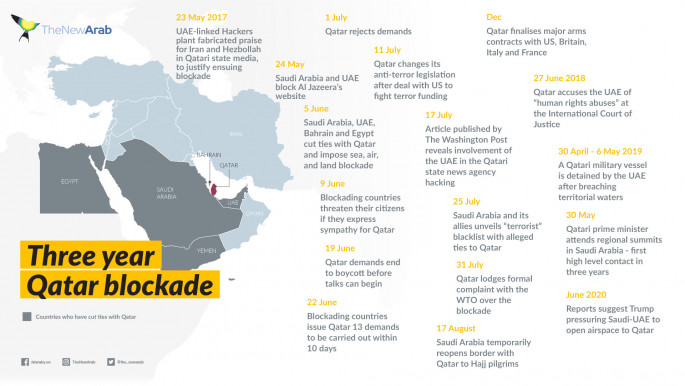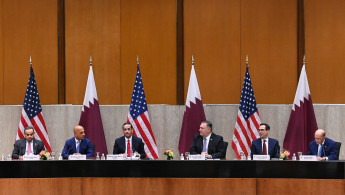Third round of US-Qatar strategic dialogue begins in Washington
The Qatar-US talks took place as Doha hosted complicated peace negotiations between the Afghan government and the Taliban. They are expected to go on until Tuesday and end with the announcement of a number of cultural, educational and economic partnerships.
"Contrary to previous years, the strategic dialogue this year will shed light on cultural, economic, and development relationships which will benefit both the American and Qatari peoples," Loulwah Al-Khater, a spokesperson for the Qatari Foreign Ministry told The New Arab’s Arabic-language service.
Read more: GCC crisis explained - Why is Qatar under blockade by Saudi Arabia and its allies?
Al-Khater also stressed Qatar's commitment to the Palestinian cause. The strategic dialogue is taking place as Washington prepares to host the formal signing of the UAE-Israel normalisation deal.
"The State of Qatar will also clarify its position on the importance of negotiating a political settlement to issues in the region and upholding the aspirations of its people. Equally, Qatar will affirm the importance of striving for a fair and just solution to the Palestinian issue," she said.
The talks are expected to cover a range of other issues.
"We have high expectations that the dialogue will be fruitful and cover a wide range of issues, including our excellent and advanced cooperation in the field of counterterrorism," David Schenker, the US’s Assistant Secretary of State for Near Eastern Affairs, said.
The first round of the US-Qatar strategic dialogue took place in January 2018 and ended with the US's formal announcement of support for Qatar against a Saudi-led blockade that is still in place.
The blockade began in June 2017 when Saudi Arabia, the United Arab Emirates, Bahrain and Egypt severed diplomatic ties with Qatar.
They accused Doha of backing radical Islamists as well as Iran, charges which Qatar strongly denied. In July Qatar won a ruling at the International Court of Justice regarding airspace restrictions imposed by the blockading countries.
Last week, Schenker said that the blockading countries were now showing "flexibility" and expressed cautious hope that the blockade would end soon.

Follow us on Facebook, Twitter and Instagram to stay connected





 Follow the Middle East's top stories in English at The New Arab on Google News
Follow the Middle East's top stories in English at The New Arab on Google News


